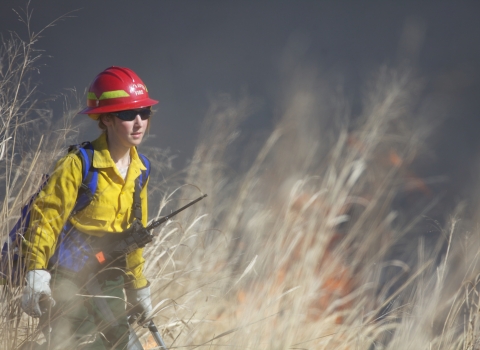Vulnerable wildlife across the nation will benefit from more than $7.7 million in grants thanks to the U.S. Fish and Wildlife Service’s Competitive State Wildlife Grant Program. Since 2008, the C-SWG Program has provided over $96 million in federal grant funds to support projects implemented by states, commonwealths, territories, and the District of Columbia to benefit fish and wildlife and their habitats, especially species at risk of declining or becoming threatened or endangered. This year’s projects will fund a variety of conservation activities including captive propagation and species reintroductions, research, species restoration and habitat management.
“This year’s funding provides vital support to our state and territory partners as they work to recover America’s declining wildlife and their habitats,” said Service Director Martha Williams. “Keeping species off the threatened and endangered species list is a goal that can be achieved only through partnerships, and this program is emblematic of the Service’s commitment to these important relationships and support.”
The Service’s Wildlife and Sport Fish Restoration Program, which administers the C-SWG Program, will fully fund 18 projects to advance conservation and species recovery in 13 states and territories including Guam and the U.S. Virgin Islands. The projects were selected from a nationally competitive slate of proposals to address priorities identified in Wildlife Action Plans. Every state, commonwealth, territory and the District of Columbia craft and maintain these plans to manage wildlife and meet each locality’s unique stewardship needs. These plans identify and prioritize actions to conserve species most in need of help, termed Species of Greatest Conservation Need (SGCN), which often include those at risk of declining or becoming threatened or endangered.
The announcement comes as the Endangered Species Act (ESA) turns 50 years old in 2023. Throughout the year, the Department of the Interior is celebrating the ESA’s importance in preventing imperiled species’ extinction, promoting the recovery of wildlife and conserving the habitats upon which they depend.
The C-SWG program facilitates interstate collaboration and species conservation at a regional level, encouraging recipients to collaborate with tribal and nongovernmental fish and wildlife managers to create nationwide conservation networks. The 2023 primary recipients include fish and wildlife agencies in Delaware, Georgia, Guam, Hawai’i, Iowa, Massachusetts, Michigan, Nebraska, South Carolina, Texas, the U.S. Virgin Islands, Washington and Wisconsin. Fortifying this spirit of collaboration is $2.3 million in nonfederal funds provided by these recipients and their partners to support the selected projects.
This year’s funded projects include proactive conservation techniques like captive propagation and species reintroductions to help avert the need for new federal listings and help recover currently listed species. Also included are three projects designed to update and enhance Wildlife Action Plans with open-access online planning tools and databases that improve these fish and wildlife agencies’ ability to share information and work collaboratively at regional or landscape scales. These projects will help support the America the Beautiful initiative to conserve, connect and restore our nation’s lands, waters and wildlife with locally led and locally designed conservation efforts and restoration approaches.
Examples of this year’s funded projects include:
- Partners in Guam will pilot recovery approaches for the federally endangered Mariana eight-spot butterfly, including propagating and releasing butterflies to augment wild populations and restoring the plants these butterflies need for habitat. Funding for this project will support the Guam Department of Agriculture’s Division of Aquatic and Wildlife Resources, in partnership with the University of Guam Center for Island Sustainability, to further recovery goals for the species.
- Partners in Nebraska, South Dakota and Wyoming will build on prior success to propagate and release 18 species of freshwater mussels across the three-state region. These include two federally endangered species, seven considered SGCN, and four SGCN not previously reared in captivity. Funding for this project will support the Nebraska Game and Parks Commission; South Dakota Game, Fish, and Parks; the Wyoming Game and Fish Department; and the University of Nebraska-Lincoln as they restore populations and prioritize waterways for future surveys, monitoring and reintroduction efforts.
- Partners in the Carolinas will work together to prioritize restoration and reintroduction efforts in one of the most diverse and imperiled freshwater fish communities in the United States, where nearly one-third of the native fish species are in urgent need of conservation action to address ongoing threats. Funding will support the North Carolina Wildlife Resources Commission, South Carolina Department of Natural Resources, Clemson University, local Soil and Water Conservation Districts, and other key partners as they prioritize survey efforts, identify restoration and reintroduction methods, and develop conservation planning tools to recover fish communities in this rapidly changing region.
The C-SWG Program is part of the larger State Wildlife Grant Program, which in March awarded a portion of $56.5 million in grants to every state, commonwealth, territory and the District of Columbia to advance conservation and protect vulnerable wildlife according to a formula based on geographic area and population size. For more information on the SWG program, including C-SWG, visit: www.fws.gov/program/state-wildlife-grants



